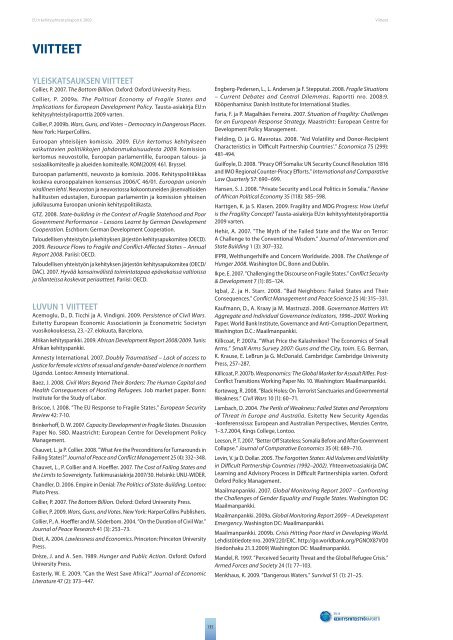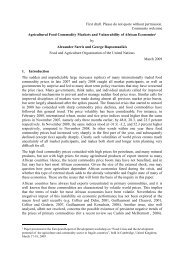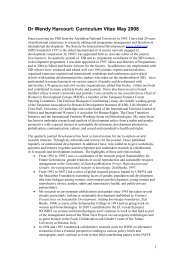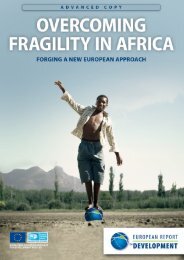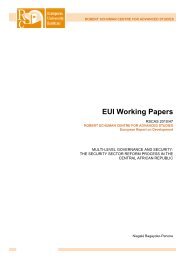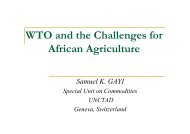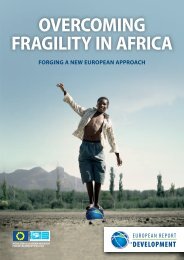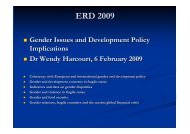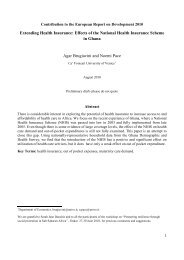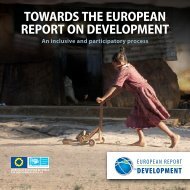LISÃÃ VAKAUTTA AFRIKKAAN
LISÃÃ VAKAUTTA AFRIKKAAN
LISÃÃ VAKAUTTA AFRIKKAAN
You also want an ePaper? Increase the reach of your titles
YUMPU automatically turns print PDFs into web optimized ePapers that Google loves.
EU:n kehitysyhteistyöraportti 2009<br />
Viitteet<br />
VIITTEET<br />
YLEISKATSAUKSEN VIITTEET<br />
Collier, P. 2007. The Bottom Billion. Oxford: Oxford University Press.<br />
Collier, P. 2009a. The Political Economy of Fragile States and<br />
Implications for European Development Policy. Tausta-asiakirja EU:n<br />
kehitysyhteistyöraporttia 2009 varten.<br />
Collier, P. 2009b. Wars, Guns, and Votes – Democracy in Dangerous Places.<br />
New York: HarperCollins.<br />
Euroopan yhteisöjen komissio. 2009. EU:n kertomus kehitykseen<br />
vaikuttavien politiikkojen johdonmukaisuudesta 2009. Komission<br />
kertomus neuvostolle, Euroopan parlamentille, Euroopan talous- ja<br />
sosiaalikomitealle ja alueiden komitealle. KOM(2009) 461. Bryssel.<br />
Euroopan parlamentti, neuvosto ja komissio. 2006. Kehityspolitiikkaa<br />
koskeva eurooppalainen konsensus 2006/C 46/01. Euroopan unionin<br />
virallinen lehti. Neuvoston ja neuvostossa kokoontuneiden jäsenvaltioiden<br />
hallitusten edustajien, Euroopan parlamentin ja komission yhteinen<br />
julkilausuma Euroopan unionin kehityspolitiikasta.<br />
GTZ. 2008. State-building in the Context of Fragile Statehood and Poor<br />
Government Performance – Lessons Learnt by German Development<br />
Cooperation. Eschborn: German Development Cooperation.<br />
Taloudellisen yhteistyön ja kehityksen järjestön kehitysapukomitea (OECD).<br />
2009. Resource Flows to Fragile and Conflict-Affected States – Annual<br />
Report 2008. Pariisi: OECD.<br />
Taloudellisen yhteistyön ja kehityksen järjestön kehitysapukomitea (OECD/<br />
DAC). 2007. Hyvää kansainvälistä toimintatapaa epävakaissa valtioissa<br />
ja tilanteissa koskevat periaatteet. Pariisi: OECD.<br />
LUVUN 1 VIITTEET<br />
Acemoglu, D., D. Ticchi ja A. Vindigni. 2009. Persistence of Civil Wars.<br />
Esitetty European Economic Associationin ja Econometric Societyn<br />
vuosikokouksessa, 23.–27. elokuuta, Barcelona.<br />
Afrikan kehityspankki. 2009. African Development Report 2008/2009. Tunis:<br />
Afrikan kehityspankki.<br />
Amnesty International. 2007. Doubly Traumatised – Lack of access to<br />
justice for female victims of sexual and gender-based violence in northern<br />
Uganda. Lontoo: Amnesty International.<br />
Baez, J. 2008. Civil Wars Beyond Their Borders: The Human Capital and<br />
Health Consequences of Hosting Refugees. Job market paper. Bonn:<br />
Institute for the Study of Labor.<br />
Briscoe, I. 2008. ”The EU Response to Fragile States.” European Security<br />
Review 42: 7-10.<br />
Brinkerhoff, D. W. 2007. Capacity Development in Fragile States. Discussion<br />
Paper No. 58D. Maastricht: European Centre for Development Policy<br />
Management.<br />
Chauvet, L. ja P. Collier. 2008. ”What Are the Preconditions for Turnarounds in<br />
Failing States” Journal of Peace and Conflict Management 25 (4): 332–348.<br />
Chauvet, L., P. Collier and A. Hoeffler. 2007. The Cost of Failing States and<br />
the Limits to Sovereignty. Tutkimusasiakirja 2007/30. Helsinki: UNU-WIDER.<br />
Chandler, D. 2006. Empire in Denial: The Politics of State-Building. Lontoo:<br />
Pluto Press.<br />
Collier, P. 2007. The Bottom Billion. Oxford: Oxford University Press.<br />
Collier, P. 2009. Wars, Guns, and Votes. New York: HarperCollins Publishers.<br />
Collier, P., A. Hoeffler and M. Söderbom. 2004. ”On the Duration of Civil War.”<br />
Journal of Peace Research 41 (3): 253–73.<br />
Dixit, A. 2004. Lawlessness and Economics. Princeton: Princeton University<br />
Press.<br />
Drèze, J. and A. Sen. 1989. Hunger and Public Action. Oxford: Oxford<br />
University Press.<br />
Easterly, W. E. 2009. ”Can the West Save Africa” Journal of Economic<br />
Literature 47 (2): 373–447.<br />
Engberg-Pedersen, L., L. Andersen ja F. Stepputat. 2008. Fragile Situations<br />
– Current Debates and Central Dilemmas. Raportti nro. 2008:9.<br />
Kööpenhamina: Danish Institute for International Studies.<br />
Faria, F. ja P. Magalhães Ferreira. 2007. Situation of Fragility: Challenges<br />
for an European Response Strategy. Maastricht: European Centre for<br />
Development Policy Management.<br />
Fielding, D. ja G. Mavrotas. 2008. ”Aid Volatility and Donor-Recipient<br />
Characteristics in ’Difficult Partnership Countries’.” Economica 75 (299):<br />
481-494.<br />
Guilfoyle, D. 2008. “Piracy Off Somalia: UN Security Council Resolution 1816<br />
and IMO Regional Counter-Piracy Efforts.” International and Comparative<br />
Law Quarterly 57: 690–699.<br />
Hansen, S. J. 2008. ”Private Security and Local Politics in Somalia.” Review<br />
of African Political Economy 35 (118): 585–598.<br />
Harttgen, K. ja S. Klasen. 2009. Fragility and MDG Progress: How Useful<br />
is the Fragility Concept Tausta-asiakirja EU:n kehitysyhteistyöraporttia<br />
2009 varten.<br />
Hehir, A. 2007. ”The Myth of the Failed State and the War on Terror:<br />
A Challenge to the Conventional Wisdom.” Journal of Intervention and<br />
State Building 1 (3): 307–332.<br />
IFPRI, Welthungerhilfe and Concern Worldwide. 2008. The Challenge of<br />
Hunger 2008. Washington DC, Bonn and Dublin.<br />
Ikpe, E. 2007. ”Challenging the Discourse on Fragile States.” Conflict Security<br />
& Development 7 (1): 85–124.<br />
Iqbal, Z. ja H. Starr. 2008. ”Bad Neighbors: Failed States and Their<br />
Consequences.” Conflict Management and Peace Science 25 (4): 315–331.<br />
Kaufmann, D., A. Kraay ja M. Mastruzzi. 2008. Governance Matters VII:<br />
Aggregate and Individual Governance Indicators, 1996–2007. Working<br />
Paper. World Bank Institute, Governance and Anti-Corruption Department,<br />
Washington D.C.: Maailmanpankki.<br />
Killicoat, P. 2007a. “What Price the Kalashnikov The Economics of Small<br />
Arms.” Small Arms Survey 2007: Guns and the City, toim. E.G. Berman,<br />
K. Krause, E. LeBrun ja G. McDonald. Cambridge: Cambridge University<br />
Press, 257–287.<br />
Killicoat, P. 2007b. Weaponomics: The Global Market for Assault Rifles. Post-<br />
Conflict Transitions Working Paper No. 10. Washington: Maailmanpankki.<br />
Korteweg, R. 2008. ”Black Holes: On Terrorist Sanctuaries and Governmental<br />
Weakness.” Civil Wars 10 (1): 60–71.<br />
Lambach, D. 2004. The Perils of Weakness: Failed States and Perceptions<br />
of Threat in Europe and Australia. Esitetty New Security Agendas<br />
-konferenssissa: European and Australian Perspectives, Menzies Centre,<br />
1–3.7.2004, Kings College, Lontoo.<br />
Leeson, P. T. 2007. ”Better Off Stateless: Somalia Before and After Government<br />
Collapse.” Journal of Comparative Economics 35 (4): 689–710.<br />
Levin, V. ja D. Dollar. 2005. The Forgotten States: Aid Volumes and Volatility<br />
in Difficult Partnership Countries (1992–2002). Yhteenvetoasiakirja DAC<br />
Learning and Advisory Process in Difficult Partnershipia varten. Oxford:<br />
Oxford Policy Management.<br />
Maailmanpankki. 2007. Global Monitoring Report 2007 – Confronting<br />
the Challenges of Gender Equality and Fragile States. Washington DC:<br />
Maailmanpankki.<br />
Maailmanpankki. 2009a. Global Monitoring Report 2009 – A Development<br />
Emergency. Washington DC: Maailmanpankki.<br />
Maailmanpankki. 2009b. Crisis Hitting Poor Hard in Developing World.<br />
Lehdistötiedote nro. 2009/220/EXC. http://go.worldbank.org/PGNOX87VO0<br />
(tiedonhaku 21.3.2009) Washington DC: Maailmanpankki.<br />
Mandel, R. 1997. ”Perceived Security Threat and the Global Refugee Crisis.”<br />
Armed Forces and Society 24 (1): 77–103.<br />
Menkhaus, K. 2009. ”Dangerous Waters.” Survival 51 (1): 21–25.<br />
135<br />
EU:N<br />
KEHITYSYHTEISTYÖRAPORTTI


